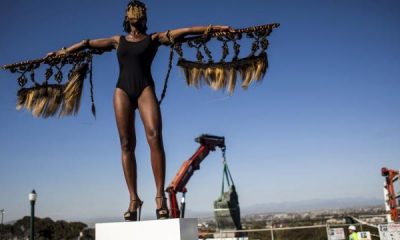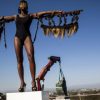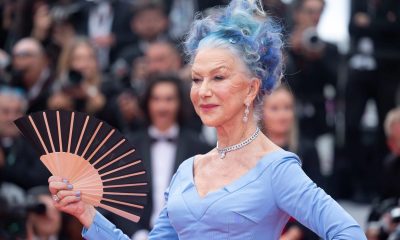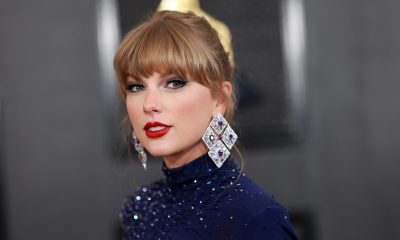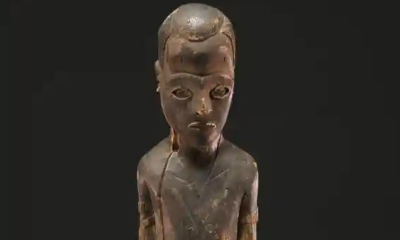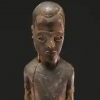ART WORLD NEWS
‘Game-changer’ museum to open in Istanbul in time for city’s biennial
[ad_1]

Arter’s new building includes 3,000 sq. m space of galleries, two theatres and a sculpture terrace
© FluPhoto, courtesy of Arter
Arter, one of Turkey’s leading contemporary art non-profits, is graduating to a museum that will be a “game changer” for Istanbul. So promises its director, Melih Fereli, who is overseeing the move from the “small white cube” on Istiklal Street to a new 18,000 sq. m building in the central Dolapdere district designed by Grimshaw Architects. It is due to open on 13 September, during the preview of the 16th Istanbul Biennial.
Thirty-five exhibitions and more than 180 art commissions produced in almost a decade at the previous space were a “testing ground”, Fereli says, for an institution that aims to foster “contemporary artistic production across all disciplines, from music to dance, theatre to sonic arts, film to literature”. It is a vision that he says springs from his background as head of the Istanbul Foundation for Culture and Arts (IKSV), the umbrella organisation behind the city’s film, theatre, music and jazz festivals as well as the biennial.
Arter is backed by the Vehbi Koç Foundation, established 50 years ago by one of Turkey’s richest industrialists. Appointed in 2005 as cultural adviser to the foundation, Fereli devised a strategy defined by contemporary art. It was “what Turkey needed”, he says, to “compensate for the rather big gap” in the education system, where “analytical thinking and discovering your own creativity is not really encouraged”.
The new direction was a passion project for Ömer Koç, third-generation scion of the Koc family and a prominent art collector. In 2007, Koç Holding became the main sponsor of the Istanbul Biennial and the foundation started buying contemporary art. Arter, which Koç chairs, opened in 2010 with a show of around 160 works from the fledgling collection.
All forms of art can be a very strong platform for freedom of expression. The worst would be for an institution or artist to exercise auto-censorship
Melih Fereli, director of Arter
This has since swelled to more than 1,300 works—roughly half by Turkish artists—which will be at the core of the new museum, Fereli says. They include pieces by major international names such as Sigmar Polke, Mona Hatoum and Theaster Gates as well as Turkey’s Sarkis and Ayşe Erkmen.
With 3,000 sq. m of flexible galleries, two theatres and a sculpture terrace, the museum is designed to “enable artists to think differently”, Fereli says. Including the collection and the building, the opening costs amount to more than €120m, according to the Koç Foundation.
While the seven inaugural displays remain under wraps, future plans include a stage work with an international sculptor and an opera co-commissioned with IKSV for 2021, as well as an exhibition of Ömer Koç’s collection in spring 2022.
Conservative Islamists were outraged by a show of Koç’s art at an Ottoman villa in Istanbul in 2017. Chanting against secularism, protesters attacked a Ron Mueck sculpture of a naked man presented in a tiled fireplace, which they possibly mistook for a mihrab, the prayer niche in a mosque.
Fereli, who co-curated the show, describes the incident as “singular” and ultimately counter-productive, since “people of all walks—secular and conservative” then flocked to see the display. Asked whether he is concerned about the threat of censorship or self-censorship at Arter, he says: “All forms of art can be a very strong platform for freedom of expression. The worst would be for an institution or artist to exercise auto-censorship.”
There is no denying that my view of the universality of culture differs from that of President Erdogan
Fereli also dismisses speculation that the museum, first announced in mid-2013 with a 2016 opening date, has been mired in government bureaucracy targeting the Koç family. (Koç Holding faced tax audits and lost a major naval defence contract in 2013 after a hotel owned by the company sheltered Gezi Park protesters fleeing riot police.) Changes in planning regulations and the complexity of the building have delayed construction, Fereli says.
“There is no denying that my view of the universality of culture differs from that of President Erdogan,” he adds. “But the onus is on all of us to ensure that the co-existence of different cultural values will continue to enrich this country’s common heritage.”
[ad_2]
Source link



